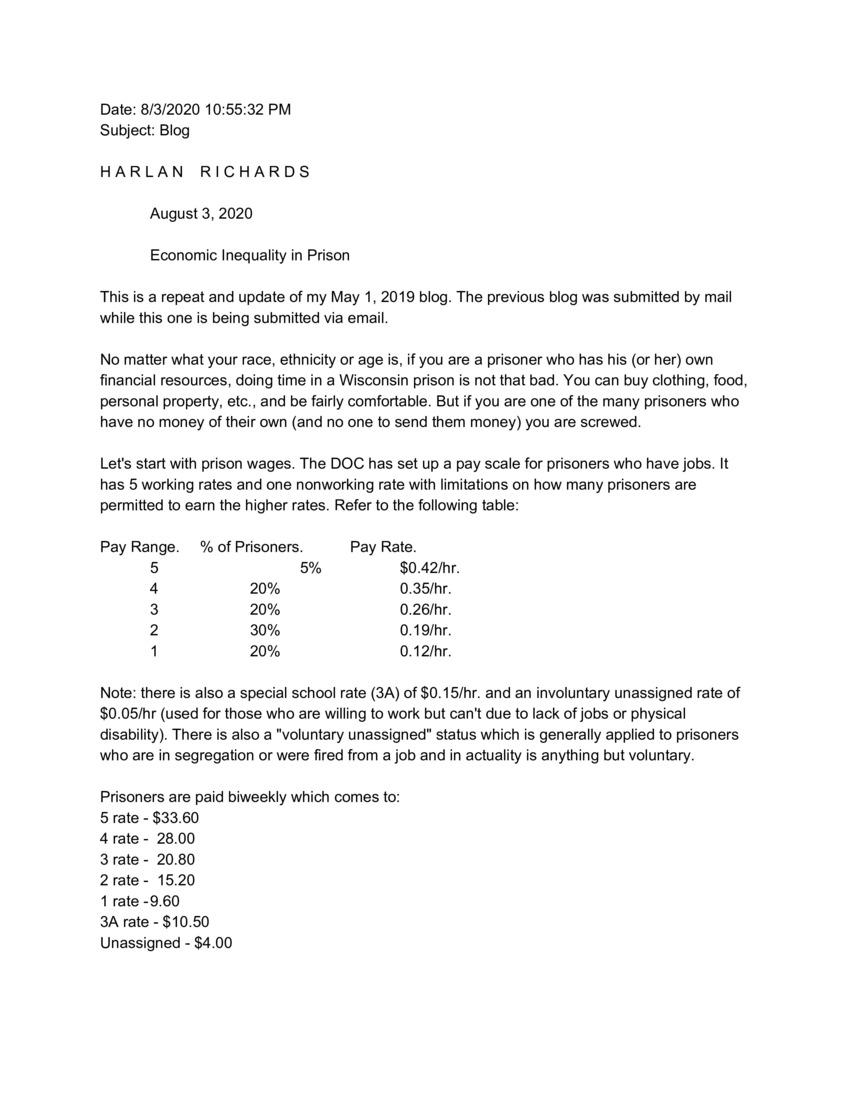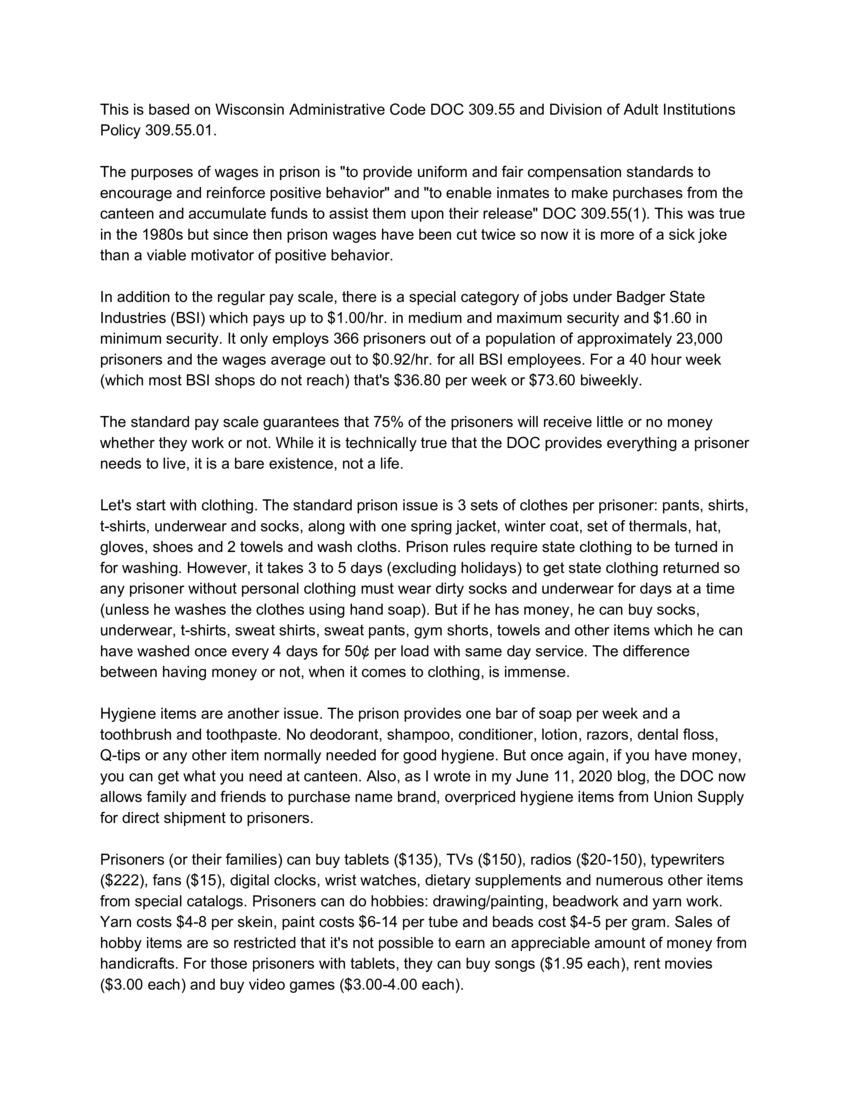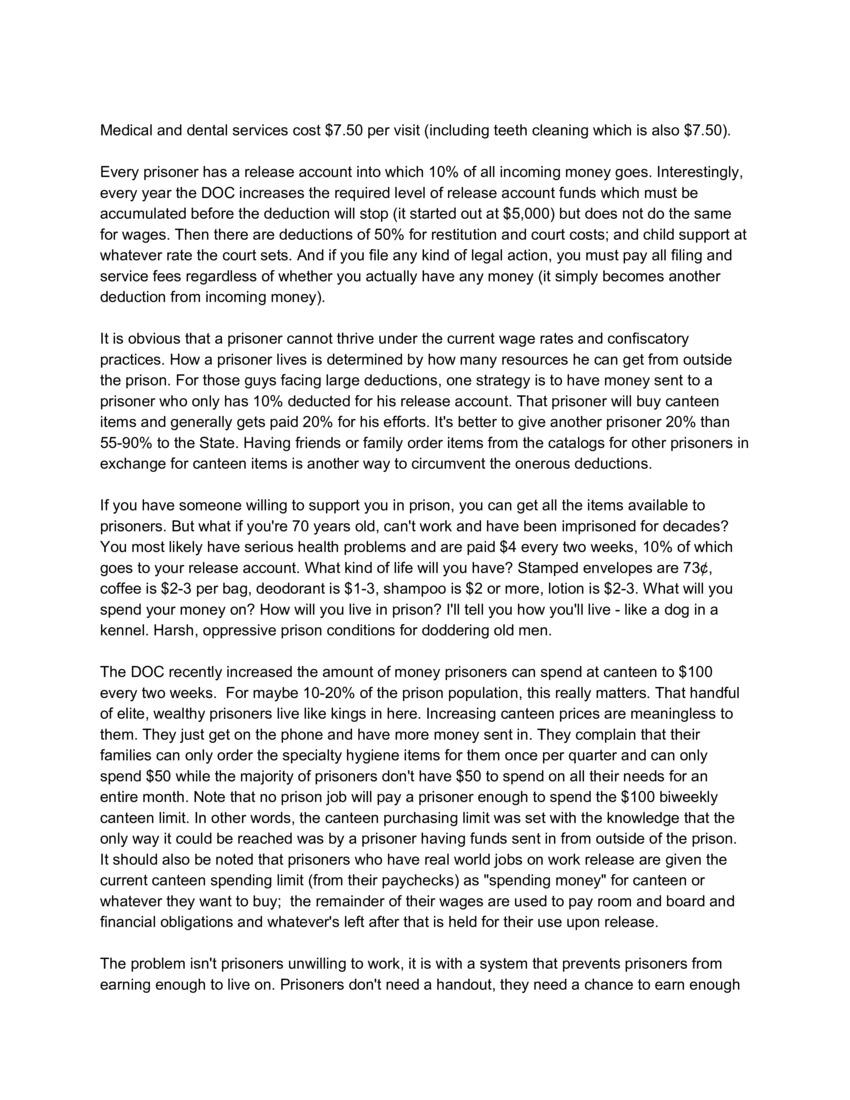
Transcription
Date: 8/3/2020 10:55:32 PM
Harlan Richards
August 3, 2020
Economic Inequality in Prison
This is a repeat and update of my May 1, 2019 blog. The previous blog was submitted by mail while this one is being submitted via email.
No Matter what your race, ethnicity or age is, if you are a prisoner who has his (or her) own financial resources, doing time in a Wisconsin prison is not that bad. You can buy clothing, food, personal property, etc., and be fairly comfortable. But if you are one of the many prisoners who have no money of their own (and no one to send them money) you are screwed.
Let's start with prison wages. The DOC has set up a pay scale for prisoners who have jobs. It has 5 working rates and one nonworking rate with limitations on how many prisoners are permitted to earn the higher rates. Refer to the following table:
Pay Range. % of Prisoners. Pay Rate.
5 5% $0.42/hr.
4 20% 0.35/hr.
3 20% 0.26/hr.
2 30% 0.19/hr.
1 20% 0.12/hr.
Note: there is also a special school rate (3A) of $0.15/hr. and an involuntary unassigned rate of $0.05 (used for those who are willing to work but can't due to lack of jobs or physical disability). There is also a *voluntary unassigned" status which is generally applied to prisoners who are in segregation or were fired from a job and in actuality is anything but voluntary.
Prisoners are paid biweekly which comes to:
5 rate - $33.60
4 rate - 28.00
3 rate - 20.80
2 rate - 15.20
1 rate - 9.60
3A rate - $10.50
Unassigned - $4.00
This is based on Wisconsin Administrative Code DOC 309.55 and Division of Adult Institutions Policy 309.55.01.
The purposes of wages in prison is "to provide uniform and fair compensation standards to encourage and reinforce positive behavior" and "to enable inmates to make purchases from the canteen and accumulate funds to assist them upon their release" DOC 309.55(1). This was true in the 1980s but since then prison wages have been cut twice so now it is more of a sick joke than a viable motivator of positive behavior.
In addition to the regular pay scale, there is a special category of jobs under Badger State Industries (BSI) which pays up to $1.00/hr. in medium and maximum security and $1.60 in minimum security. It only employs 366 prisoners out of a population of approximately 23,000 prisoners and wages average out to $0.92/hr. for all BSI employees. For a 40 hour week (which most BSI shops do not reach that's $36.80 per week or $73.60 biweekly.
The standard pay scale guarantees that 75% of the prisoners will receive little or no money whether they work or not. While it is technically true that the DOC provides everything a prisoner needs to live, it is a bare existence, not a life.
Let's start with clothing. The standard prison issue is 3 sets of clothes per prisoner: pants, shirts, t-shirts, underwear and socks, along with one spring jacket, winter coat, set of thermals, hat, gloves, shoes and 2 towels and wash cloths. Prison rules require state clothing to be turned in for washing. However, it takes 3 to 5 days (excluding holidays) to get state clothing returned so any prisoner without personal clothing must wear dirty socks and underwear for days at a time (unless he washes the clothing using hand soap). But if he has money, he can buy socks, underwear, t-shirts, sweat shirts, sweatpants, gym shorts, towels and other items which he can have washed once every 4 days for 50¢ per load with same day service. The difference between having money or not, when it comes to clothing, is immense.
Hygiene items are another issue. The prison provides one bar o soap per week and a toothbrush and toothpaste. No deodorant, shampoo, conditioner, lotion, razors, dental floss, Q-tips or any other item normally needed for good hygiene. But once again, if you have money, you can get what you need at canteen. Also, as I wrote in my June 11, 2020 blog, the DOC now allows family and friends to purchase name brand, overpriced hygiene items from Union Supply for direct shipment to prisoners.
Prisoners (or their families) can buy tablets ($135), TVs ($150), radios ($20-150), typewriters ($222), fans ($15), digital clocks, wrists watches, dietary supplements and numerous other items from special catalogs. Prisoners can do hobbies: drawing, painting, beadwork and yarn work. Yarn costs $4-8 per skein, paint costs $6-14 per tube and beads cost $4-5 per gram. Sales of hobby items are so restricted that it's no possible to earn an appreciable amount of money from handicrafts. For those prisoners with tablets, they can buy songs ($1.95 each), rent movies ($3.00 each) and buy video games ($3.00-4.00 each).
Medical and dental services cost $7.50 per visit (including teeth cleaning which is also $7.50).
Every prisoner has release account into which 10% of all incoming money goes. Interestingly, every year the DOC increases the required level of release account funds which must be accumulated before the deduction will stop (it started out at $5,000) but does not do the same for wages. Then there are deductions of 50% for restitution and court costs; and child support at whatever rate the court sets. And if you file any kind of legal action, you must pay all filing and service fees regardless of whether you actually have any money (it simply becomes another deduction from incoming money).
It is obvious that a prisoner cannot thrive under the current wage rates and confiscatory practices. How a prisoner cannot thrive under the current wage rates and confiscatory practices, How a prisoner lives in determined by how many resources he can get from outside the prison. For those guys facing large deductions, one strategy is to have money sent to a prisoner who only has 10% deducted for his release account. That prisoner will buy canteen items and generally gets paid 20% for his efforts. It's better to give another prisoner 20% than 55-90% to the State. Having friends or family order items from the catalogs for other prisoners in exchange for canteen items Is another way to circumvent the onerous deductions.
If you have someone willing to support you in prison, you can get all the items available to prisoners. But what if you're 70 years old, can't work and have been imprisoned for decades? You most likely have serious health problems are paid $4 every two weeks, 10% of which goes to your release account. What kind of life will you have? Stamped envelopes are 73¢, coffee is $2-3 per bag, deodorant is $1-3, shampoo is $2 or more, lotion is $2-3. What will you spend your money on? How will you live in prison? I'll tell you how you'll live - like a dog in a kennel. Harsh, oppressive prison conditions for doddering old men.
The DOC recently increased the amount of money prisoners can spend at canteen to $100 every two weeks. For maybe 10-20% of the prison population, this really matters. That handful of elite, wealthy prisoners live like kings in here, Increasing canteen prices are meaningless to them. They just get on the phone and have more money sent in. They complain that their families can only order the specialty hygiene items for them once per quarter and can only spend $50 while the majority of prisoners don't have $50 to spend on all their needs for an entire month. Note that no prison job will pay a prisoner enough to spend the $100 biweekly canteen limit. In other words, the canteen purchasing limit was set with the knowledge that the only way it could be reached was by a prisoner having funds sent in from the outside of the prison. It should also be noted that prisoners who have real world jobs on work release are given the current canteen spending limit (from their paychecks) as "spending money" for canteen or whatever they want to buy; the remainder of their wages are used to pay room and board and financial obligations and whatever's left after that is held for their use upon release.
The problem isn't prisoners unwilling to work, it is with a system that prevents prisoners from earning enough to live on. Prisoners don't need a handout, they need a chance to earn enough money to live on - something the DOC won't allow. Able-bodied prisoners should be paid enough to spend up to the canteen limit if they are willing to work. The DOC would rather bleed the families of prisoners whom they know will support their loved one if humanly possible.
Prisoners serving sentences into their old age should be given a pension they can live on (just like they would in the free world). Citizens deserve to be able to live out their golden years in relative comfort regardless of whether they are imprisoned or free.
Other posts by this author
|
2021 jun 25

|
2021 may 25

|
2021 apr 23

|
2021 feb 19

|
2021 feb 17

|
2021 feb 15

|
More... |





Replies